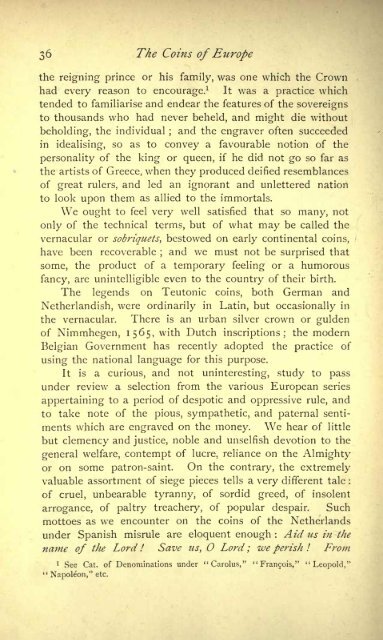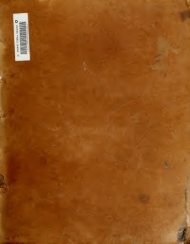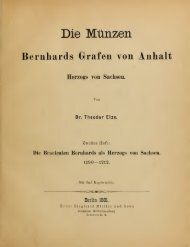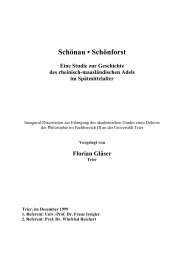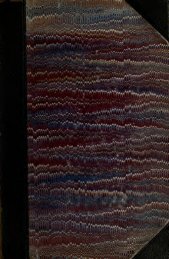- Page 7:
COINAGE EUROPEAN CONTINENT
- Page 11 and 12: THE COINAGE OF THE EUROPEAN CONTINE
- Page 13 and 14: PREFACE IT is hoped that the follow
- Page 15 and 16: ' TABLE OF CONTENTS PREFACE . FACE
- Page 17 and 18: Table of Contents xi DESCRIPTIVE OU
- Page 19 and 20: Xlll continued. PAGE Lucca 452 Geno
- Page 21 and 22: LIST OF ILLUSTRATIONS Philip IV. of
- Page 23 and 24: List of Illustrations xvii' PAGE 33
- Page 25 and 26: INTRODUCTION I THE unabated and gen
- Page 27 and 28: Introduction 3 to the wants, feelin
- Page 29 and 30: Introduction 5 more centralised con
- Page 31 and 32: Introduction 7 ing ideas and possib
- Page 33 and 34: Napoleon Introduction 9 healthy emu
- Page 35 and 36: Introduction 1 1 A scrutiny of the
- Page 37 and 38: Introdiiction \ 3 centralisation. A
- Page 39 and 40: Introduction 1 5 France by the Arab
- Page 41 and 42: Introduction 1 7 certain resemblanc
- Page 43 and 44: Introduction 1 9 VII The Low Countr
- Page 45 and 46: Introduction 2 I autonomous coins o
- Page 47 and 48: Introduction 2 3 numismatic annals
- Page 49 and 50: Introduction 2 5 of France from the
- Page 51 and 52: Introduction 2 7 her frontier exten
- Page 53 and 54: Introduction 29 concave fabric of t
- Page 55 and 56: Introduction 3 1 number, as in Fran
- Page 57 and 58: Introduction 33 began to appear on
- Page 59: Introduction 35 and by co-operative
- Page 63 and 64: Introduction 39 placed on the coina
- Page 65 and 66: Introduction 4 1 indecision as to t
- Page 67 and 68: Introduction 43 It was upon the las
- Page 69 and 70: Introduction 45 The use of copper a
- Page 71 and 72: Introduction 4 7 material for fabri
- Page 73 and 74: Introduction 49 Immense quantities
- Page 75 and 76: Introduction 5 1 a new type and of
- Page 77 and 78: Introduction 53 regime purely from
- Page 79 and 80: fniroduction 5 5 disregard of econo
- Page 81 and 82: Introduction 5 7 repeated, Was boun
- Page 83 and 84: Introduction 59 date or the value w
- Page 85 and 86: Introduction 6 1 the Hand, just as
- Page 87 and 88: Introduction 63 contenting himself
- Page 89 and 90: Introduction 65 commercial detail ;
- Page 91: THREE CATALOGUES: I. CATALOGUE OF E
- Page 94 and 95: 70 The Coins of Europe were issued
- Page 96 and 97: 72 ' The Coins of Europe and mezzo-
- Page 98 and 99: 74 The Coins of Europe le Gros, and
- Page 100 and 101: 76 The Coins of Europe and Dukes of
- Page 102 and 103: 78 The Coins of Europe Kalmiintz, K
- Page 104 and 105: 8o The Coins of Europe usually disp
- Page 106 and 107: 82 The Coins of Europe Vettore Emma
- Page 108 and 109: 84 The Coins of Europe Guben, Havel
- Page 110 and 111:
86 The Coins of Europe Brussels, an
- Page 112 and 113:
88 The Coins of Europe republic. Bu
- Page 114 and 115:
go The Coins of Europe common with
- Page 116 and 117:
92 The Coins of Europe during the r
- Page 118 and 119:
94 The Coins of Europe Corfu. A coi
- Page 120 and 121:
96 The Coins of Europe pacification
- Page 122 and 123:
98 The Coins of Europe tion-money b
- Page 124 and 125:
ioo The Coins of Europe Eichstadt,
- Page 126 and 127:
' iO2 The Coins of Europe We find i
- Page 128 and 129:
IO4 The Coins of Europe Fossombrone
- Page 130 and 131:
io6 The Coins of Europe Fumes, W. F
- Page 132 and 133:
io8 The Coins of Europe Gliickstadt
- Page 134 and 135:
1 1 o The Coins of Europe Gruitrode
- Page 136 and 137:
1 1 2 7Yie Coins of Europe Jacob, L
- Page 138 and 139:
1 1 4 The Coins of Europe the 1 7th
- Page 140 and 141:
1 1 6 The Coins of Eiirope place st
- Page 142 and 143:
1 1 8 The Coins of E^lrope Charles
- Page 144 and 145:
I2O The Coins of Europe Boufflers,
- Page 146 and 147:
122 The Coins of Europe Lucera, in
- Page 148 and 149:
124 The Coins of Europe etc., and a
- Page 150 and 151:
126 The Coins of Europe of 2, 4, 8,
- Page 152 and 153:
128 The Coins of Europe Meddersheim
- Page 154 and 155:
1 30 The Coins of E^lrope Messina,
- Page 156 and 157:
132 The Coins of Europe the lordshi
- Page 158 and 159:
134 The Coins of Europe the Kings o
- Page 160 and 161:
136 The Coins of Europe in 1155. Tw
- Page 162 and 163:
138 The Coins of Europe Neufchateai
- Page 164 and 165:
1 40 The Coins of Europe Oberwesel,
- Page 166 and 167:
142 The Coins of Europe curious cop
- Page 168 and 169:
144 The Coins of Europe hours durin
- Page 170 and 171:
146 The Coins of Europe and during
- Page 172 and 173:
148 The Coins of Europe We have bef
- Page 174 and 175:
150 The Coins of Europe Eiffel, Neu
- Page 176 and 177:
152 The Coins of Europe mark was, l
- Page 178 and 179:
154 The Coins of Europe other of 15
- Page 180 and 181:
156 The Coins of Europe Saint-Venan
- Page 182 and 183:
158 The Coins of Europe on obv., an
- Page 184 and 185:
160 The Coins of Europe money was p
- Page 186 and 187:
1 62 The Coins of Europe Smallenber
- Page 188 and 189:
164 The Coins of Europe among which
- Page 190 and 191:
1 66 The Coins of Europe Tagliacozz
- Page 192 and 193:
1 68 The Coins of Europe left, OLL
- Page 194 and 195:
1 70 The Coins of Europe bracteates
- Page 196 and 197:
172 The Coins of Europe Vannes, a m
- Page 198 and 199:
1 74 The Coins of Europe chiefly fo
- Page 200 and 201:
176 The Coins of Europe here or at
- Page 202 and 203:
178 The Coins of Europe Yennc, a mi
- Page 205 and 206:
II. CATALOGUE OF EUROPEAN DENOMINAT
- Page 207 and 208:
Catalogue of European Denominations
- Page 209 and 210:
Catalogue of European Denominations
- Page 211 and 212:
Catalogue of European Denominations
- Page 213 and 214:
Catalogue of European Denominations
- Page 215 and 216:
1 Catalogue of European Denominatio
- Page 217 and 218:
Catalogue of European Denominations
- Page 219 and 220:
Catalogue of Eiiropean Denomination
- Page 221 and 222:
. Catalogue of European Denominatio
- Page 223 and 224:
Catalogue of European Denominations
- Page 225 and 226:
. Catalogue of Eiiropean Denominati
- Page 227 and 228:
' 'Catalogue of European Denominati
- Page 229 and 230:
Catalogue of European Denominations
- Page 231 and 232:
Catalogue of European Denominations
- Page 233 and 234:
.Catalogue of E^tropean Denominatio
- Page 235 and 236:
Catalogue of European Denominations
- Page 237 and 238:
'Catalogite of European Denominatio
- Page 239 and 240:
Catalogue of European Denominations
- Page 241 and 242:
Catalogue of European Denominations
- Page 243 and 244:
Catalogue of European Denominations
- Page 245 and 246:
Catalogue of European Denominations
- Page 247 and 248:
Catalogue of European Denominations
- Page 249 and 250:
Catalogue of European Denominations
- Page 251 and 252:
Catalogue of European Denominations
- Page 253 and 254:
Catalogue of European Denominations
- Page 255 and 256:
. Catalogue of European Denominatio
- Page 257 and 258:
Catalogue of European Denominations
- Page 259 and 260:
Catalogite of European Denomination
- Page 261 and 262:
Catalogiie of European Denomination
- Page 263 and 264:
Catalogue of European Denominations
- Page 265 and 266:
Catalogue of European Denominations
- Page 267:
Catalogue of European Denominations
- Page 270 and 271:
246 The Coins of Europe 1460 John a
- Page 272 and 273:
248 The Coins of Europe 1409 Bernar
- Page 274 and 275:
250 The Coins of Europe Electors of
- Page 276 and 277:
252 The Coins of Europe Electors of
- Page 278 and 279:
254 The Coins of Europe 1 109 Wladi
- Page 280 and 281:
256 The Coins of Europe 1025 Miecis
- Page 282 and 283:
258 The Coins of Europe 1660 Charle
- Page 284 and 285:
260 The Coins of Europe Dukes of At
- Page 286 and 287:
262 The Coins of Europe Counts and
- Page 288 and 289:
264 The Coins of Europe Counts of W
- Page 290 and 291:
266 The Coins of Europe 1218 Arnoul
- Page 292 and 293:
268 The Coins of Europe Dukes of Fe
- Page 294 and 295:
270 The Coins of Europe 1466 Galeaz
- Page 296 and 297:
272 The Coins of Europe 1253 Pietro
- Page 298 and 299:
274 The Coins of Europe 1105 Roger
- Page 300 and 301:
276 The Coins of Europe Anglo-Galli
- Page 302 and 303:
2 7 8 The Coins of Eiiropc 1127 Gui
- Page 304 and 305:
280 The Coins of Europe Counts of B
- Page 306 and 307:
282 The Coins of Europe 1248 Alice
- Page 308 and 309:
284 The Coins of Europe 1125 Roger
- Page 310 and 311:
286 The Coins of Europe 1 60 1 -8 J
- Page 312 and 313:
288 The Coins of Europe Dukes of No
- Page 314 and 315:
Seigneurs de Sully 1398 1446 George
- Page 316 and 317:
The Coins of Europe IX. SPAIN Kings
- Page 319 and 320:
I. GERMANY CONFORMABLY with the pri
- Page 321 and 322:
Descriptive Outline of the Coinages
- Page 323 and 324:
Descriptive Outline of the Coinages
- Page 325 and 326:
Descriptive Outline of the Coinages
- Page 327 and 328:
Descriptive Outline of the Coinages
- Page 329 and 330:
Descriptive Outline of the Coinages
- Page 331 and 332:
Descriptive Outline of the Coinages
- Page 333 and 334:
Descriptive Outline of the Coinages
- Page 335 and 336:
Descriptive Outline of the Coinages
- Page 337 and 338:
Descriptive Outline of the Coinages
- Page 339 and 340:
Descriptive Outline of the Coinages
- Page 341 and 342:
Brunswick-Luneburg : triple thaler,
- Page 343 and 344:
Descriptive Outline of the Coinages
- Page 345 and 346:
' Descriptive Outline of the Coinag
- Page 347 and 348:
Descriptive Outline of the Coinages
- Page 349 and 350:
Descriptive Outline of the Coinages
- Page 351 and 352:
PRUSSIAN COINS, HTH-i8TH c. Schilli
- Page 353 and 354:
Descriptive Outline of the Coinages
- Page 355 and 356:
Descriptive Outline of the Coinages
- Page 357 and 358:
Descriptive Outline of the Coinages
- Page 359 and 360:
COI'NS OF AUSTRIA AND THE TYROL, 14
- Page 361 and 362:
Descriptive Outline of the Coinages
- Page 363 and 364:
Descriptive Outline of the Coinages
- Page 365 and 366:
Descriptive Outline of the Coinages
- Page 367 and 368:
Descriptive Outline of the Coinages
- Page 369 and 370:
Descriptive Outline of the Coinages
- Page 371 and 372:
Descriptive Outline of the Coinages
- Page 373 and 374:
Descriptive Outline of the Coinages
- Page 375 and 376:
Descriptive O^ltline of the Coinage
- Page 377 and 378:
Descriptive Outline of the Coinages
- Page 379 and 380:
Descriptive Outline of the Coinages
- Page 381 and 382:
Descriptive Outline of the Coinages
- Page 383 and 384:
Descriptive Outline of the Coinages
- Page 385 and 386:
Descriptive Outline of the Coinages
- Page 387 and 388:
RUSSIAN COINS (CHIEFLY PATTERNS), 1
- Page 389 and 390:
Descriptive Outline of the Coinages
- Page 391 and 392:
Descriptive Outline of the Coinages
- Page 393 and 394:
Descriptive Outline of the Coinages
- Page 395 and 396:
Descriptive Outline of the Coinages
- Page 397 and 398:
Descriptive Outline of the Coinages
- Page 399 and 400:
Descriptive Outline of the Coinages
- Page 401 and 402:
Descriptive Outline of the Coinages
- Page 403 and 404:
Descriptive Outline of the Coinages
- Page 405 and 406:
Descriptive Outline of the Coinages
- Page 407 and 408:
Descriptive Outline of the Coinages
- Page 409 and 410:
Descriptive Outline of the Coinages
- Page 411 and 412:
Descriptive OiUline of the Coinages
- Page 413 and 414:
Descriptive Outline of the Coinages
- Page 415 and 416:
Descriptive Outline of the Coinages
- Page 417 and 418:
COINS OF THE SOUTHERN NETHERLANDS.
- Page 419 and 420:
Descriptive O^ttline of the Coinage
- Page 421 and 422:
Descriptive Outline of the Coinages
- Page 423 and 424:
Descriptive Outline of the Coinages
- Page 425 and 426:
Descriptive Outline of the Coinages
- Page 427 and 428:
Descriptive Outline of the Coinages
- Page 429 and 430:
Descriptive Outline of the Coinages
- Page 431 and 432:
Descriptive Outline of the Coinages
- Page 433 and 434:
Batavia : 48 stuiver, 1645. Arg. (c
- Page 435 and 436:
' Descriptive Outline of the Coinag
- Page 437 and 438:
COINS OF THE NORTHERN NETHERLANDS.
- Page 439 and 440:
RULERS OF THE NETHERLANDS. Charles
- Page 441 and 442:
Descriptive Outline of the Coinages
- Page 443 and 444:
Descriptive Outline of the Coinages
- Page 445 and 446:
Descriptive Outline of the Coinages
- Page 447 and 448:
Descriptive Outline of the Coinages
- Page 449 and 450:
Descriptive Outline of the Coinages
- Page 451 and 452:
Descriptive O^ltline of the Coinage
- Page 453 and 454:
VENETIAN COINS. Matapan, i4th c. Go
- Page 455 and 456:
VENETIAN COINS. Silver ducat, later
- Page 457 and 458:
Descriptive Outline of the Coinages
- Page 459 and 460:
SAVOYARD COINS, 13111-17x11 c. Ludo
- Page 461 and 462:
Descriptive Outline of the Coinages
- Page 463 and 464:
COINS OF THE MEDICI FAMILY, 1533-17
- Page 465 and 466:
Descriptive Outline of the Coinages
- Page 467 and 468:
Descriptive Outline of the Coinages
- Page 469 and 470:
Descriptive Outline of the Coinages
- Page 471 and 472:
Descriptive Outline of the Coinages
- Page 473 and 474:
Descriptive Outline of the Coinages
- Page 475 and 476:
Maria Louisa, Duchess of Parma and
- Page 477 and 478:
Descriptive Outline of the Coinages
- Page 479 and 480:
Descriptive Ozitline of the Coinage
- Page 481 and 482:
Descriptive Outline of the Coinages
- Page 483 and 484:
SICILIAN COINS. Incuse silver denar
- Page 485 and 486:
Descriptive Outline of the Coinages
- Page 487 and 488:
COINS OF THE KNIGHTS OF ST. JOHN OF
- Page 489 and 490:
Descriptive Outline of the Coinages
- Page 491 and 492:
Descriptive Outline of the Coinages
- Page 493 and 494:
Descriptive Outline of the Coinages
- Page 495 and 496:
Descriptive Outline of the Coinages
- Page 497 and 498:
FRANCE : COINS OF HENRY III. AND IV
- Page 499 and 500:
FRANCE: COINS OF LOUIS XIV. AND XV.
- Page 501 and 502:
FRENCH REVOLUTIONARY COINS, 1791-93
- Page 503 and 504:
Descriptive Oittline of the Coinage
- Page 505 and 506:
FRANCE : NAPOLEON I. AS FIRST CONSU
- Page 507 and 508:
Descriptive Outline of the Coinages
- Page 509 and 510:
Descriptive Outline of the Coinages
- Page 511 and 512:
Descriptive Outline of the Coinages
- Page 513 and 514:
Descriptive Outline of the Coinages
- Page 515 and 516:
Descriptive Oiitline of the Coinage
- Page 517 and 518:
Descriptive Outline of the Coinages
- Page 519 and 520:
Descriptive Outline of the Coinages
- Page 521 and 522:
Descriptive Oiitline of the Coinage
- Page 523 and 524:
Descriptive Outline of the Coinages
- Page 525 and 526:
FRENCH FEUDAL COINS. 1. Pavilion if
- Page 527 and 528:
Descriptive Outline of the Coinages
- Page 529 and 530:
Descriptive Outline of the Coinages
- Page 531 and 532:
Descriptive Outline of the Coinages
- Page 533 and 534:
Descriptive Outline of the Coinages
- Page 535 and 536:
Descriptive Outline of the Coinages
- Page 537 and 538:
SPANISH COINS, I3TH-I8TH c. LEON AN
- Page 539 and 540:
Descriptive Outline of the Coinages
- Page 541 and 542:
Descriptive Outline of the Coinages
- Page 543 and 544:
Descriptive Outline of the Coinages
- Page 545 and 546:
Descriptive Outline of the Coinages
- Page 547 and 548:
Descriptive O^ltl^ne of the Coinage
- Page 549 and 550:
Descriptive Outline of the Coinages
- Page 551 and 552:
Descriptive Outline of the Coinages
- Page 553 and 554:
Descriptive Outline of the Coinages
- Page 555 and 556:
Descriptive Outline of the Coinages
- Page 557 and 558:
Descriptive Outline of the Coinages
- Page 559:
Descriptive Outline of the Coinages
- Page 562 and 563:
533 The Coins of Europe Antwerp, 73
- Page 564 and 565:
540 The Coins of Europe King of Den
- Page 566 and 567:
542 The Coins of Europe Early coppe
- Page 568 and 569:
544 The Coins of Europe German occu
- Page 570 and 571:
546 The Coins of Europe Keller, Got
- Page 572 and 573:
548 The Coins of Eitrope Moors of G
- Page 574 and 575:
550 The Coins of Europe Plantagenet
- Page 576 and 577:
22 552 The Coins of Europe Seville,
- Page 578 and 579:
554 The Coins of Europe Venlo, 405
- Page 580 and 581:
" Mr. Hazlitt has done much work du
- Page 582:
30. Gleanings in Old Garden Literat


